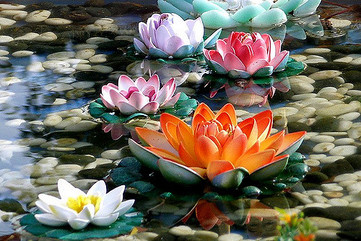 Pāramitā means "perfection" or "completeness." It relates to the pali word parama, which means “supreme” and suggests the qualities that a bodhisattva endeavors to fulfill through walking the path of practice. Pāramitā can also be defined as “gone to the beyond” or as in the how the Chinese characters convey its meaning, referring to its transcendental quality: “crossing over to the other shore”. The pāramitās are the culmination of virtues. These virtues are cultivated in order to purify karma and guide the practitioner to live wholesomely in order to realize awakening and save all beings from dukkha. The pāramitās are referenced in the Maha Prajnaparamita Sutra (Heart Sutra), the Lotus Sutra, the Diamond Sutra and several other Buddhist texts. There are six pāramitās:
While the pāramitās are listed as separate qualities, in truth, they are all inter-related. Each pāramitā contains all the others. Because of this, it is important that we explore and come to understand the the nature of interbeing of the six pāramitās. The Five Cultivations are a reflection on how we can invite the practice of the pāramitās into our daily life by reminding us through daily recitation that every moment offers the opportunity the cultivate and practice the pāramitās. In future posts, we will explore each of the pāramitās individually and how they fit within the larger whole of a singular practice. The Five Cultivations (for daily recitation) I vow to cultivate humility. Recognizing the illusionary state of reality, where truth is conditional, dependent on subjective knowledge, I will let go of my opinions and bias. Realizing that ideas and opinions are conditioned by the six senses and are an expression of subjective truth, I will practice dhyana so that I might become as a newborn, devoid of conditioning. I vow to cultivate generosity. Recognizing that all things are impermanent, I will let go of my sense of ownership over possessions and people. Realizing that sickness, old age, and death come to all, and that I cannot control my own body, I will forgo trying to control others. I will practice dāna so that I may have no need. I vow to cultivate stability. Recognizing that the opportunity to study the path of liberation comes rarely, and then for a fleeting moment, I will subdue discontent. Realizing that my teacher and the sangha, are as my family, I will study with them lovingly and attentively. I will practice vīrya so that I may learn the effortlessness of the way. I vow to cultivate harmony. Recognizing that mindfulness is the foundation of a peaceful life, I will treat each moment as if it were my last. Realizing that my speech, actions and thoughts can cause unhappiness and discontent, I will guide the doors of my body, mouth and mind at the expense of my own comfort for the sake of harmony. I will practice sīla and kshanti so that I may have patience with my own shortcomings. I vow to cultivate compassion. Recognizing that the sage of the Shakya clan taught selflessly for forty-five years after his awakening, and that all of the ancestors down to my true teacher, have given their bodies for my sake, I will study the ways of the Buddhas and Great Teachers. Realizing that the path is opened to me because of the compassion and wisdom of all who came before me, I will practice karuṇā and prajñā so that I may cast off body and mind and find my true-self. I bow in gratitude to the Buddhas through all time and space. Photo credit: Lotus Flower
0 Comments
Leave a Reply. |
A blog by the Lotus Heart Zen Meditation and Study Group members
Practice SchedulesArchives
June 2022
|

 RSS Feed
RSS Feed
